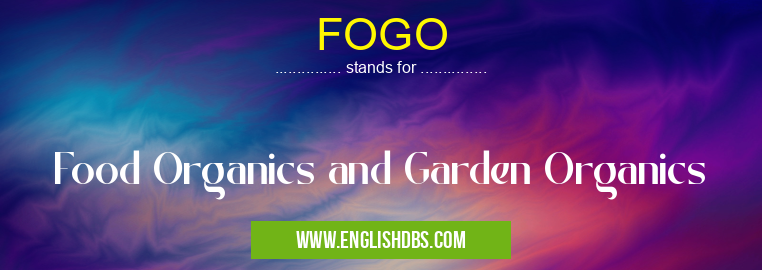What does FOGO mean in FOOD & NUTRITION
FOGO, an abbreviation for Food Organics and Garden Organics, refers to a waste collection system that aims to divert organic waste from landfills, thereby reducing greenhouse gas emissions and promoting sustainable waste management practices.

FOGO meaning in Food & Nutrition in Miscellaneous
FOGO mostly used in an acronym Food & Nutrition in Category Miscellaneous that means Food Organics and Garden Organics
Shorthand: FOGO,
Full Form: Food Organics and Garden Organics
For more information of "Food Organics and Garden Organics", see the section below.
FOGO Collection and Processing
FOGO programs typically involve a separate collection system for organic waste, such as:
- Kitchen scraps, including fruits, vegetables, and meat
- Food-soiled paper products, such as pizza boxes and paper towels
- Garden waste, including grass clippings, leaves, and branches
Collected organic waste is then transported to processing facilities, where it undergoes various treatments, such as:
- Composting, which converts organic matter into a soil amendment
- Anaerobic digestion, which generates biogas and compost
Benefits of FOGO
- Greenhouse Gas Reduction: Organic waste decomposing in landfills releases methane, a potent greenhouse gas. FOGO systems divert this waste, reducing methane emissions.
- Soil Health: Compost derived from FOGO programs provides valuable nutrients and improves soil structure, supporting healthy plant growth.
- Resource Recovery: FOGO programs recover nutrients from organic waste, reducing the need for synthetic fertilizers.
- Waste Diversion: FOGO systems significantly reduce the amount of organic waste sent to landfills, extending their lifespan and conserving valuable space.
Essential Questions and Answers on Food Organics and Garden Organics in "MISCELLANEOUS»FOOD"
What is FOGO?
FOGO stands for Food Organics and Garden Organics. It is a waste stream that includes food scraps, yard waste, and other organic materials.
What materials can I put in my FOGO bin?
FOGO bins can accept a wide range of organic materials, including:
- Food scraps (fruits, vegetables, meat, fish, dairy, bread)
- Yard waste (grass clippings, leaves, twigs, branches)
- Coffee grounds and tea bags
- Paper towels and napkins
What materials should I NOT put in my FOGO bin?
The following materials should NOT be placed in FOGO bins:
- Plastics
- Metals
- Glass
- Hazardous materials
- Pet waste
- Dairy products (in some areas)
Why is it important to separate FOGO from other waste?
Separating FOGO from other waste has several benefits:
- Reduces greenhouse gas emissions
- Creates nutrient-rich compost
- Diverts organic materials from landfills
How is FOGO processed?
FOGO is typically processed through composting, a natural process that breaks down organic materials into a nutrient-rich soil amendment.
What are the benefits of using FOGO compost?
FOGO compost has numerous benefits, including:
- Improves soil health by adding nutrients and organic matter
- Reduces the need for chemical fertilizers
- Conserves water by improving soil moisture retention
Final Words: FOGO systems are essential components of a sustainable waste management strategy. By diverting organic waste from landfills, these programs reduce greenhouse gas emissions, promote soil health, recover resources, and contribute to waste diversion goals. Implementing and supporting FOGO initiatives is crucial for creating a more sustainable and environmentally conscious society.
